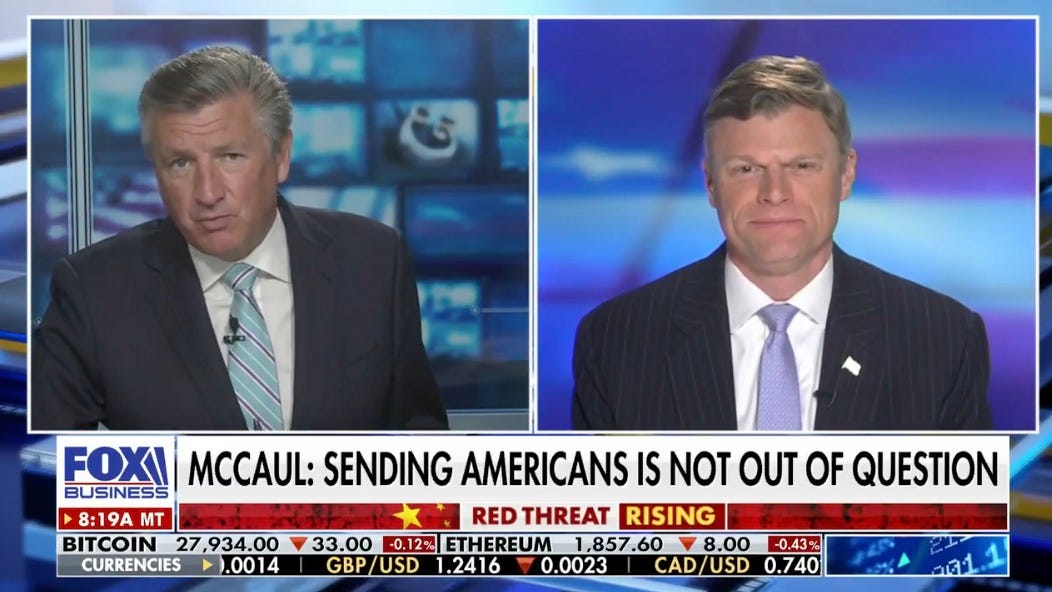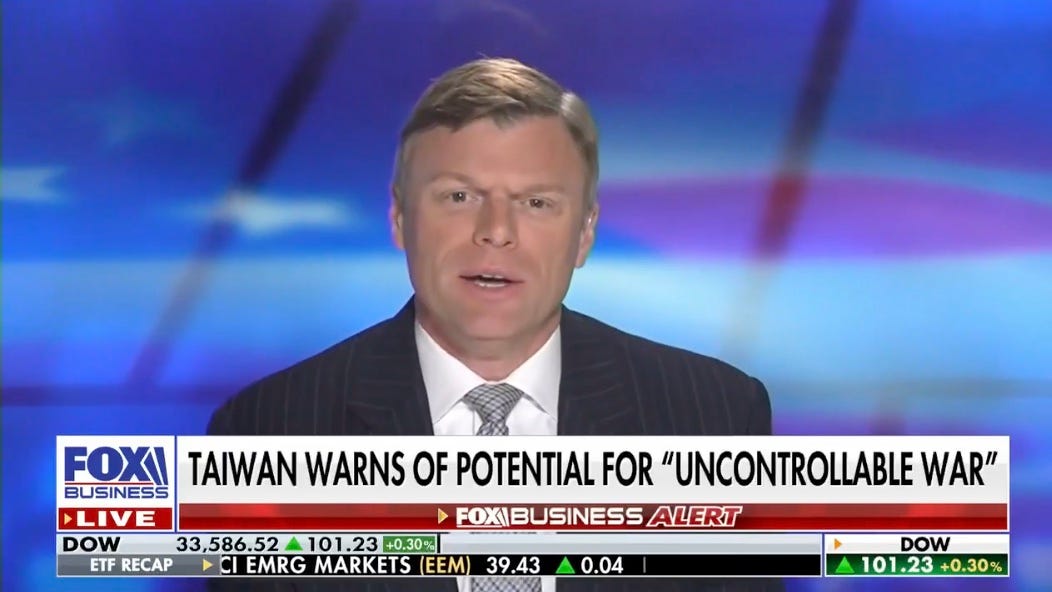Biden Humiliated Again by China and the Moochers of Europe
Taiwan overestimates its support but war isn’t imminent

You’d think China would be grateful for Joe Biden and his administration. In two years in office, he has yet to explain a policy to defend against China to the American public or even attempt to rally the free world to make life harder for Beijing.
There’s an excellent piece of dialogue in “Lawrence of Arabia” that sums up government thinking in general:
Colonel Brighton: “Look, sir, we can’t just do nothing.”
General Allenby: “Why not? It’s usually best.”
And so it goes with Biden’s China policy: the presumed elegance of nothing. On cue, Jay Shambaugh, the Treasury Department’s under secretary for international affairs, explicitly rejected strategic decoupling with China’s economy last week, telling Bloomberg:
We occasionally have issues with different economic policies in China and we will always defend U.S. economic interests as well--but we will not in any way be trying to separate these two economies entirely.
Thus is the Biden administration taking effectively no steps to break America’s dependence on China for everything ranging from life-saving pharmaceuticals to minerals critical for the administration’s vaunted green transition to manufactured goods of all variety.
Biden himself has refused to go farther declaring blithely, “I see stiff competition with China” as if America’s chief adversary were a competing polo team. Fearing even that language might be too strong the president promised the pointless G20 summit last November that, “I’m looking to manage this competition responsibly.” Super.
Ever the optimist, Treasury official Shambaugh also told Bloomberg:
The world expects us to be able to work together on some of these big challenges whether its climate or debt. We’re really trying to make sure we’re working with the Chinese on these important issues.
Too bad no one told Beijing, which seems no friendlier from the do-nothing assist from Biden.
Recently, the communist-led Chinese government brokered an agreement between Saudi Arabia and Iran to reestablish diplomatic relations. The common denominator between the three governments is that all want to express displeasure with Washington and spotlight America’s diminished role under its current leadership.
But the clincher came when French President Emmanuel Macron recently visited China for a state visit earlier this month. During “Emmanuelle Does Beijing,” the French president said quite explicitly that Europe should not be drawn into a conflict with China over trivial matters like Taiwan or security in the Western Pacific, which is critical for the trade in energy and other goods on which the economy depends.
Pundits cast the development as merely a slap at the United States as Europe made explicit the previously tacit reality that it was useless to the free world’s confrontation of China’s economic, political, and military aggression against it.
The reality was far worse: a complete failure of Biden’s de facto Europe First foreign policy.
Biden has intentionally ostracized critical U.S. partners like Saudi Arabia. He has continued the Bush-Obama-Trump trend of diminishing our naval and air forces in the Pacific. He humiliated the United States in Afghanistan worse than any time since the fall of Saigon. He encouraged Hamas and Hezbollah, the Iranian-backed proxies at war with Israel, and also encouraged the Houthi in their Iranian-backed war against Saudi Arabia and the UAE. He has encouraged socialists across Latin America and welcomed a wave of illegals across our southern border. But the one bright spot of his foreign policy was supposed to be the restoration of our good relations with our “traditional” allies in Western Europe—rich moochers every one—who were perturbed that meanie Republicans suggested they fulfill their own promises to fund more of their own defense.
Alas not. Biden and both parties in Congress have seen fit to pay for 75 percent of the Ukraine war—now more than $100 billion with perhaps ten times that amount on tap before the end of war and reconstruction—letting wealthy Europe off the hook for its own security for the umpteenth time. The extent of Europe’s gratitude was summed up perfectly by Macron: this continent of splendid moochers expects us to fund their defense since our war-losing defense establishment has conditioned them to do so, and they intend to do basically nothing real to help us in a critical struggle with China. Meanwhile, countries that matter like the oil-producing Gulf states and India look elsewhere for leadership out of necessity.
Biden and Macron could also care less that the government that runs China does so without the support of its people—a critical vulnerability that the free world ought to exploit. The real conscience of China and its people’s quest for freedom and peace is behind bars in Hong Kong and on the mainland. Biden and the European moralists have said virtually nothing about these political prisoners, but eagerly anticipate future meetings with Xi for the sake of pageantry—mistaking activities for accomplishments as our diplomatic experts often do.
This is the position the next president will face thanks especially to Biden, but also to the Trump-Obama-Bush inability to see China and Europe for what they are.

McConnell Leaving or Staying?
Rumors swirled that Mitch McConnell, the 81-year-old Senate Republican leader, would be retiring from the Senate after a long absence for illness. But his handlers are now signaling he will return this week.
It’s one thing for McConnell to remain in the Senate, but another for him to stay as Republican leader. The absurdity brings to mind the missive of Oliver Cromwell when he finally had enough with the Rump Parliament in 1653, and stood to say:
You have sat too long for any good you have been doing lately… Depart, I say, and let us have done with you. In the name of God, go!
Let’s hope McConnell leaves before he has to be wheeled from the Senate floor in an incoherent state like Strom Thurmond or Robert Byrd. Senator Rick Scott (R-Florida) challenged McConnell for the leadership after the last election. Republican senators choosing him or another reformer to succeed McConnell would be a sign they are serious about bringing new energy to the caucus, bridging the establishment and the New Right, and taking the majority in 2024 with a real mandate.
In other words, it’s a long shot.
The China Reopening Play Could Be Played Out
Part of the soothing and misleading picture that has equities in the U.S. overpriced and poised to drop is a looming reopening of China, which ran a stiff global competition with Australia, Japan, and Taiwan for who could have the longest and most unreasonable isolation period for COVID and eked out the competition. However, as Mark Simon and I discussed in a recent episode of Simon & Whiton, the long-awaited boom may never come. China’s real estate crisis continues with no end in sight. Despite a strong year-on-year increase in exports, there are other signs of stress and lethargy in China’s economy, both in domestic real estate and its export-dependent sectors. Excerpt:
[00:16:08] Christian Whiton: We’re heading into a recession here in the U.S., and that will reverberate in East Asia. You know more about the Chinese economy than I do, but I think this China reopening has been overplayed. People keep looking for this huge surge in demand, and it doesn't seem to be materializing, unless you're seeing something different.
[00:18:52] Mark Simon: Well, I'll give you two measures that I look at. They just came out. There's a great website called Freight Alley, and it tracks all the boring stuff that people don't like, but shipping rates 11 months ago, 12 months ago, the price to ship a 40-foot container from Hong Kong to Los Angeles was approximately $13,000.
Today, that same container is moving for less than $1,400, because of the collapse of demand. Now the other thing that's happened too is we are seeing trucking rates in the United States at their lowest levels since 2009…
But here's the other thing with China, local governments have no money. They got nothing. They're laying people off. They're missing payrolls, they're missing project payments and to get the money they're doing what you can do, and it's what you can do inside a totalitarian regime.
They're basically appropriating things. They're going to banks. They're going to companies. They're saying, how much money does the guy have in the bank account? Oh, well, the Mark Simon Company has 100 million RMB, we're going to tax you on that. We're going to tax you 4%. So 4 million walk out the door, that's a tax.
So people, people are not undertaking economic activity in China. And the other thing too is I think we are now really starting to see the bite of demographics in China. In other words, it's not, it's not the number of people that die. It's the number of people that turn 65 to 70 and stop working… The fact is the Chinese are hitting this hard. It's a hard wall.
Taiwan Overestimates its Position
In the past two or so years, Taiwan and its defense from a possible Chinese attack has gone from a niche issue to one near the top of the national security agenda. The attention is welcome, but comes with some notable and politically dangerous imprecision.
Last week, I argued that tough talk about putting U.S. troops into Taiwan by some U.S. congressmen, including the head of the House Foreign Relations Committee, misses the point. What Taiwan needs is for allied militaries to allow it to coordinate with them and for the U.S. to expedite Taiwan’s purchase of ready-to-deploy weapons that have proved effective in Ukraine. It needs to lengthen its draft from a mere four months to Israeli standards of just over two years, train a militia, and retire flag officers who aren’t up to the challenge from China. It needs to spend far more on defense and make life a lot easier for Americans who want to do business or live in Taiwan, restoring its own lethargic economic growth through free market reforms and liberalized worker immigration.
Very little of this is in the offing, nor is much change likely ahead of a presidential election in January. As usual, the pro-business KMT party is appallingly weak on China and the ruling DPP party is not great on business (although being not great on business in East Asia is still pretty good on business by the standards of the Americas or Europe).
Taiwan still faces the reality of an American electorate that is far more reticent about foreign obligations than our current crop of more vocal congressmen would make it seem. Furthermore, the Chinese threat to America is much more complex than just the threat to Taiwan: it involves political and economic warfare being waged directly against the USA and an economic, political, and cultural conflict around the world, especially in Southeast Asia. Another reality is that China is unlikely to attack Taiwan on some of the more aggressive timelines floated recently, which could lead to loss of political attention. This will be exacerbated by the already-underway glut in semiconductors that will make that sector boring again—the loss of a key talking point for Taiwan’s critical place in the U.S. high tech supply chain.
While it is pretty hard to imagine the United States not becoming involved somehow in a Chinese attack on Taiwan, that does not guarantee that America and its allies will become fully involved and preserve Taiwan as it exists today. Politically and militarily, a lot has to happen on both sides of the Pacific to deter China better.





